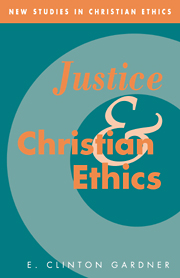Book contents
- Frontmatter
- Contents
- General editor's preface
- Acknowledgments
- 1 Introduction
- 2 The classical tradition of virtue
- 3 The righteousness of God and human justice
- 4 Justice in the Puritan covenantal tradition
- 5 John Locke: justice and the social compact
- 6 The American Republic – a case study: civic virtue and the public good
- 7 Covenant, justice, and law
- Notes
- Select bibliography
- Index
7 - Covenant, justice, and law
Published online by Cambridge University Press: 31 March 2010
- Frontmatter
- Contents
- General editor's preface
- Acknowledgments
- 1 Introduction
- 2 The classical tradition of virtue
- 3 The righteousness of God and human justice
- 4 Justice in the Puritan covenantal tradition
- 5 John Locke: justice and the social compact
- 6 The American Republic – a case study: civic virtue and the public good
- 7 Covenant, justice, and law
- Notes
- Select bibliography
- Index
Summary
THE GOVENANTAL BASIS OF SOCIETY
The polarities and tensions reflected in the debates surrounding the creation of the American republic were rooted in fundamentally different presuppositions – about the moral ordering of history, the dignity and goodness of human nature, and the basis and proper end of civil society. The purpose in choosing the founding of the American republic as a case study was to use that event as an illustration of the way in which one particular theological tradition approached the problems of justice and law during the formative years of the new nation. During that time a distinctively new form of government was established whereby the people rule themselves under a system of laws which they have made and to which they have given their assent.
In that process the Puritan – and ultimately biblical – idea of covenant provided the most fundamental symbol for understanding both the basis of society and the nature of the Founders' own undertaking. “It is of the nature and essence of every society,” Winthrop had noted, “to be knit together by some covenant, either expressed or implied.” The adoption of this paradigm did not issue in the establishment of Puritanism. Rather, it signified the unity of a people knit together by mutual commitment to each other in a common endeavor, a commitment based finally upon promise and trust.
Not only did covenant serve as the mediator of an essentially biblical and communal conception of society; it also provided the basis for a synthesis of reason and revelation grounded in a strong doctrine of Creation.
- Type
- Chapter
- Information
- Justice and Christian Ethics , pp. 117 - 142Publisher: Cambridge University PressPrint publication year: 1995



